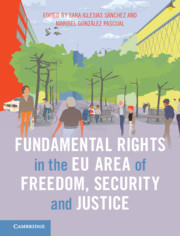Book contents
- Fundamental Rights in the EU Area of Freedom, Security and Justice
- Fundamental Rights in the EU Area of Freedom, Security and Justice
- Copyright page
- Dedication
- Contents
- Contributors
- Foreword
- Preface
- Common Abbreviations
- Introduction Fundamental Rights at the Core of the EU AFSJ
- Part I The General Framework for Fundamental Rights Protection in the AFSJ
- Part II Asylum, Migration and Borders
- Part III Judicial Cooperation in Civil Matters
- Part IV Judicial Cooperation in Criminal Matters and Police Cooperation
- Part V Cross-Cutting Issues of Fundamental Rights in the AFSJ
- Index
Introduction - Fundamental Rights at the Core of the EU AFSJ
Published online by Cambridge University Press: 06 August 2021
- Fundamental Rights in the EU Area of Freedom, Security and Justice
- Fundamental Rights in the EU Area of Freedom, Security and Justice
- Copyright page
- Dedication
- Contents
- Contributors
- Foreword
- Preface
- Common Abbreviations
- Introduction Fundamental Rights at the Core of the EU AFSJ
- Part I The General Framework for Fundamental Rights Protection in the AFSJ
- Part II Asylum, Migration and Borders
- Part III Judicial Cooperation in Civil Matters
- Part IV Judicial Cooperation in Criminal Matters and Police Cooperation
- Part V Cross-Cutting Issues of Fundamental Rights in the AFSJ
- Index
Summary
The normative consolidation of the Area of Freedom, Security and Justice (AFSJ) and the entry into force of the Charter of Fundamental Rights of the EU (the Charter) has transformed the Union as we know it.
It is common knowledge that the AFSJ has undergone impressive normative and jurisprudential developments in recent times. An abundance of new instruments were adopted in the years following the entry into force of the Treaty of Lisbon, joining the already vast body of pre-Lisbon secondary law in the various fields covered by the AFSJ: civil and criminal judicial cooperation, as well as matters related to borders, migration and asylum. National authorities and courts have now become, or at least are becoming, well acquainted with the AFSJ acquis, which is shown by the impressive increase in the number of preliminary references made by national courts.
- Type
- Chapter
- Information
- Publisher: Cambridge University PressPrint publication year: 2021
- 1
- Cited by

